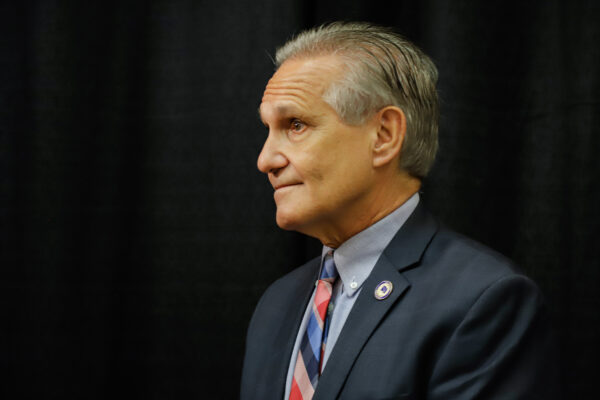
Lt. Gov. Kevin Meyer announced Tuesday that he will not seek re-election next year.
“So with that I’m announcing today — it’s difficult,” he said, pausing to compose himself. “I will not be running for re-election to lieutenant governor in 2022. I didn’t think it’d be this tough. It’s a job I really love, and I cherish the time I’ve had with you, governor, to do that.”
Meyer’s announcement came at the end of a news conference in which he and Gov. Mike Dunleavy announced they would introduce a catch-all elections bill. They said it’s aimed at improving transparency and confidence in the election process.
Meyer, as lieutenant governor, is in charge of the state Division of Elections.
In May, he took a step toward running for re-election. He filed a letter of intent with the Alaska Public Offices Commission. But on Tuesday he said he did not want to be a candidate in an election he’ll also oversee.
“I need to be impartial so I can meet these challenges head on, without any appearance of bias or conflict,” he said. “I think that’s extremely important as far as voter trust and confidence in our election process.”
Dunleavy did not comment at the news conference on Meyer’s decision to not seek re-election. He has not yet announced a new running mate.
Before becoming lieutenant governor, Meyer served on the Anchorage Assembly, in the state House and state Senate.
“Frankly after 30 years of elected service — and I just counted up before this press conference — 19 elections that I’ve been in, if you count the primary and the general,” he said. “I’m kind of looking forward to sitting this one out, frankly, and being able to focus 100% of my time on having the best election we can possibly have in 2022.”
RELATED: Lt. Gov. Meyer defends handling of Alaska’s last election, as he and governor weigh the next one
The 2022 election will be the inaugural run for the state’s ranked choice voting system, which voters adopted last year in Ballot Measure 2.
Meyer has faced criticism from some conservative voters for his handling of the last election, including from Alaskans in the Mat-Su, a Dunleavy stronghold. But Meyer has repeatedly defended Alaska’s 2020 election as fair, despite national conspiracy theories about rigged voting machines and local conservative opposition to measures that make it easier to vote by mail.
The text of the elections bill Dunleavy said he plans to introduce isn’t available yet.
Meyer said Tuesday that one part of the bill would make changes to the automatic voter registration of anyone who gets a Permanent Fund dividend. He said it leaves a lot of people on the rolls who don’t want to vote or who left the state.
Another aspect would allow voters a chance to correct their ballot if they make a mistake, such as forgetting to sign the envelope on a mail-in ballot.
[Sign up for Alaska Public Media’s daily newsletter to get our top stories delivered to your inbox.]
Scott Kendall, an Anchorage attorney who wrote the ranked choice voting law, said he needs to see the bill before he passes judgment, but he’s concerned about changes to the automatic registration system, which Alaska voters adopted by a ballot measure in 2016.
“People need to remember, 65–66% of Alaskans voted in favor of that change,” Kendall said. “So changing it to something else — again, got to see the details, but that was concerning to hear.”
Kendall has his differences with the Dunleavy administration. He’s the former chief of staff to Bill Walker, the ex-governor now campaigning against Dunleavy to win his seat back. But Kendall said Meyer is a great public servant and “a class act.”
“He handled last year’s elections well and I think him being in the office, he was a positive influence on the way our elections were run, and probably a positive influence on the administration generally,” Kendall said.
Many of Alaska’s lieutenant governors oversaw the Division of Elections while running for re-election. Grumbling about conflicts of interest stemming from that dual role is common. In most states, though, elections are run by a secretary of state, which is typically an elected position, too.
Liz Ruskin is the Washington, D.C., correspondent at Alaska Public Media. Reach her at lruskin@alaskapublic.org. Read more about Liz here.





